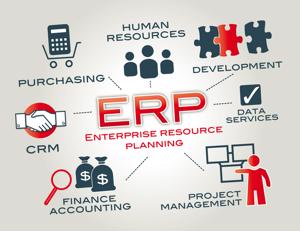Understanding manufacturing ERP technology’s automation power
Automation is the "secret sauce" that makes modern ERP solutions so beneficial. By consolidating, streamlining and automating a wide range of tasks including logistics and reporting, an ERP system can eliminate silos and reduce the amount of manual work required across a manufacturing organization. Contained within well-implemented and properly maintained solutions, ERP automation can yield productivity increases of more than 80% in some cases.
Many essential manufacturing functions can be automated within an ERP to keep production on track while avoiding costly delays and issues with quality. Let's dive into some of the specific areas in which automated ERP functionality can really pay dividends.
Logistics and supply chain management
Without ERP automation, it's difficult to keep up with customer orders while also avoiding excessive inventory and production related problems. Customers may be left waiting on backorders, which in turn contributes to the so-called bullwhip effect that distorts supply chain forecasts.
ERP automation helps by:
- Recording exactly when buyers order and need components.
- Integrating order and inventory data to avoid backorders.
- Indicating when and where to move those items prior to production.
- Incorporating data from wireless technologies, which can replace paper-based processes.
- Signaling which dock to send a finished order to when it's ready for shipment.
AI-powered monitoring and reordering
Artificial intelligence (AI) refers to computer programs that reason in ways similar to a human. In a manufacturing context, AI can help with automation by analyzing datasets to make decisions without the need for time-consuming manual human intervention.
"An AI-powered program could track key performance indicators in real time."
An AI-powered program could track key performance indicators in real time so that it triggers reorders from suppliers as needed. This capability is helpful for reliably meeting demand by ensuring that supplies don't routinely run low and in turn fuel customer dissatisfaction.
Manufacturing specifications and parameters
Following manufacturing specs is essential in meeting quality expectations and controlling costs by avoiding errors. ERP automation provides pivotal support in getting the proper specifications for each job to the right spot.
For example, an automated ERP system could read a customer's specifications for a semiconductor from a purchase order and then relay them to the processing equipment in question so that the work is always done with the right die locations. Similar efficiency extends to jobs such as welding and lamination, both of which come with highly variable specifications that must be followed.
Chatbots and customer service
Chatbots are an important innovation in responding to customer service inquiries. They behave much like humans over chat, but are fully automated behind the scenes.
Using AI, they can comb through datasets such as customer interaction histories and orders to provide an accurate response. Chatbot interactions help free up more time for technical support teams, who get to spend much less of their days fielding routine requests that a chatbot could probably handle.
ERP automation has wide-reaching and transformative effects. To learn more about how to get started on the road to ERP success, contact the Accent Software team today.





